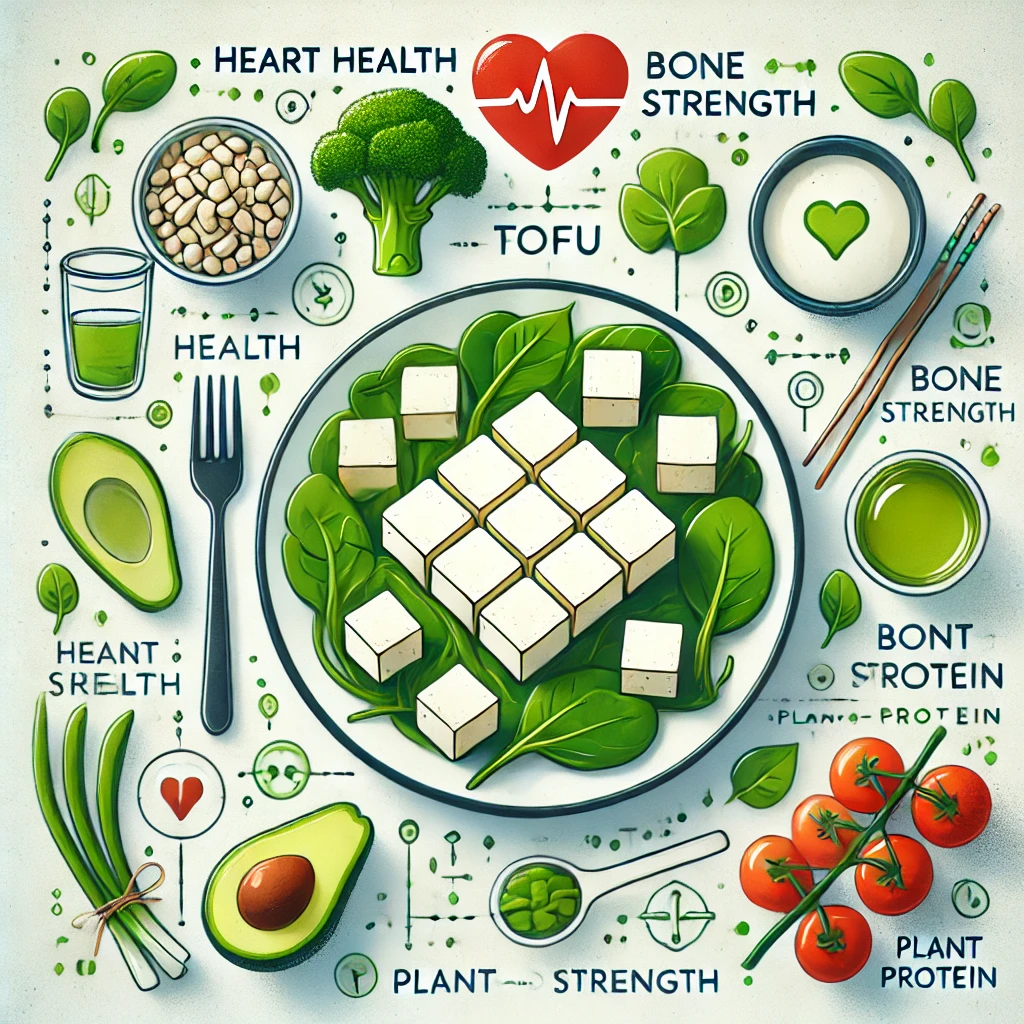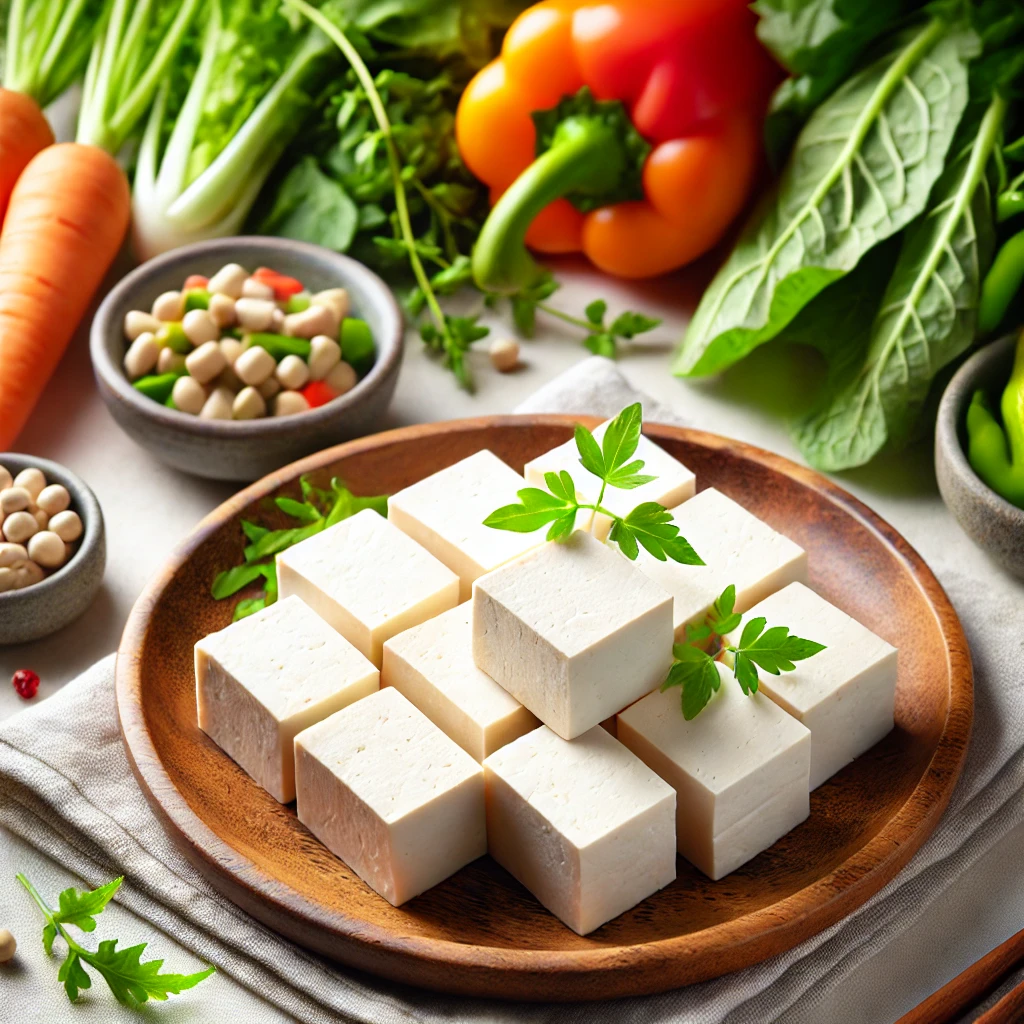Bean curd, also known as tofu, is a staple in many Asian cuisines, celebrated for its versatility, nutritional benefits, and ability to adapt to a variety of culinary styles. Derived from soybeans, tofu is made by curdling fresh soy milk and pressing the resulting curds into solid blocks. Its soft texture and subtle flavor make it a perfect addition to both savory and sweet dishes. But beyond its culinary uses, tofu is widely recognized for its impressive health benefits.

1. A Rich Source of Plant-Based Protein
For those following vegetarian, vegan, or plant-based diets, tofu is an invaluable protein source. Unlike some plant-based foods, tofu is a complete protein, meaning it contains all nine essential amino acids that the body cannot produce on its own. These amino acids are critical for muscle repair, hormone production, immune function, and other vital processes.
A 100-gram serving of tofu contains approximately 8 grams of protein, making it a comparable option to animal-based proteins like chicken or beef. Whether you’re looking to build muscle, maintain lean mass, or simply add more protein to your diet, tofu provides a nutritious, plant-based alternative to meat.
2. Low in Calories, High in Nutrients
Tofu is naturally low in calories, making it an ideal food for those aiming to maintain or lose weight. Despite its low calorie count, tofu is nutrient-dense and provides a range of important vitamins and minerals. A typical serving of tofu (100 grams) contains approximately:
- Calories: 76
- Protein: 8 grams
- Fat: 4 grams
- Carbohydrates: 2 grams
- Fiber: 1 gram
In addition to these macronutrients, tofu is also rich in micronutrients, including calcium, magnesium, iron, and phosphorus. These nutrients are crucial for bone health, blood circulation, muscle function, and overall body maintenance.
3. Heart Health and Cholesterol Reduction
One of the most well-known benefits of tofu is its positive impact on heart health. Tofu is cholesterol-free and low in saturated fats, which makes it a heart-healthy food choice. It also contains omega-3 fatty acids, which are known for their role in reducing inflammation and promoting cardiovascular health.
Research shows that consuming soy-based products like tofu can help lower LDL (bad) cholesterol levels, which is a key factor in reducing the risk of heart disease. The isoflavones in soy (plant compounds with estrogen-like effects) are believed to play a role in improving blood vessel function, reducing arterial stiffness, and enhancing circulation, which all contribute to better heart health.
4. Bone Health and Calcium Boost
Tofu is often fortified with calcium, an essential mineral that supports the development and maintenance of strong bones and teeth. Calcium-fortified tofu can provide as much as 20% of the recommended daily intake of calcium in just one serving.
For those who are lactose intolerant or avoid dairy, tofu is an excellent alternative to traditional dairy products. Consuming calcium-rich foods like tofu can help prevent osteoporosis and other bone-related conditions, especially as you age.
In addition to calcium, tofu is also a good source of magnesium and phosphorus, which further contribute to bone strength and overall skeletal health.
5. Weight Management and Satiety
Tofu’s high protein content, combined with its low-calorie profile, makes it an ideal food for weight management. Protein-rich foods have been shown to increase feelings of fullness and satisfaction, helping to reduce overall calorie intake throughout the day.
Additionally, tofu contains fiber, which aids digestion and helps maintain a healthy gut. Fiber also promotes satiety, preventing overeating and supporting better control of hunger cues. Including tofu in your diet can be a strategic way to manage your weight without feeling deprived of satisfying meals.
6. Tofu and Hormonal Health
The isoflavones found in tofu (particularly genistein and daidzein) are plant-based compounds that mimic the effects of estrogen in the body. These compounds can have both positive and negative effects on hormonal health, depending on individual circumstances.
- For Menopause: Isoflavones may help alleviate menopausal symptoms like hot flashes, night sweats, and mood swings. Some studies suggest that soy-based foods like tofu can provide mild relief for women experiencing hormonal fluctuations during menopause.
- Breast and Prostate Health: Although soy isoflavones are weak estrogens, research indicates that consuming soy foods like tofu does not increase the risk of breast or prostate cancer. In fact, some studies suggest that regular consumption of tofu may reduce the risk of certain hormone-related cancers.
7. Anti-Inflammatory and Antioxidant Properties
Tofu is rich in antioxidants, which help protect the body from oxidative stress and inflammation. The isoflavones in tofu have been studied for their potential to reduce inflammation, which is linked to chronic diseases like heart disease, diabetes, and certain cancers.
Moreover, the antioxidants in tofu help neutralize free radicals, unstable molecules that can cause damage to cells and tissues, contributing to aging and various health issues. By including antioxidant-rich foods like tofu in your diet, you can help support your body’s defense mechanisms and reduce the risk of inflammation-related conditions.
8. Supports Digestive Health
Tofu, particularly silken tofu, contains a significant amount of water and fiber, which can aid digestion and promote a healthy gut. Fiber helps regulate bowel movements, prevent constipation, and feed beneficial bacteria in the gut, which play a role in overall digestive health.
In addition to fiber, tofu is a low-FODMAP food, meaning it is unlikely to cause digestive discomfort for individuals with sensitive stomachs or conditions like irritable bowel syndrome (IBS). For those who struggle with digestive issues, tofu can be a gentle and nourishing option.
9. Tofu for Sustainable Eating
Not only is tofu a nutritional powerhouse, but it is also an environmentally sustainable food choice. Soybeans, from which tofu is made, require fewer resources like water and land to produce compared to raising livestock for meat. This makes tofu a more sustainable and eco-friendly option for individuals looking to reduce their carbon footprint.
Incorporating tofu into your diet can contribute to a more sustainable food system, helping to reduce greenhouse gas emissions, deforestation, and water consumption associated with meat production.
10. Versatility in the Kitchen
One of the best things about tofu is its versatility. Whether you prefer it grilled, stir-fried, baked, or blended into smoothies, tofu can adapt to a wide range of culinary styles. Its mild flavor allows it to take on the taste of whatever seasonings, sauces, or marinades you pair it with, making it a highly adaptable ingredient.
Here are a few ways to enjoy tofu in your meals:
- Stir-Fried Tofu: Toss tofu cubes with vegetables and soy sauce for a quick and healthy stir-fry.
- Tofu Scramble: Crumble tofu into a skillet with turmeric, salt, and pepper to create a protein-packed alternative to scrambled eggs.
- Grilled Tofu: Marinate tofu in your favorite sauce and grill it for a smoky, flavorful dish.
- Tofu Smoothies: Blend silken tofu into smoothies for a creamy, protein-rich base.

